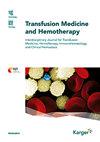Validation of a Parvovirus B19 NAT Assay for Screening of Umbilical Cord Blood for Allogenic Hematopoietic Stem Cell Donation
IF 1.9
4区 医学
Q3 HEMATOLOGY
引用次数: 0
Abstract
Introduction: Parvovirus B19 transmitted by umbilical cord blood (UCB) products may cause severe disease in allogenic hematopoietic stem cell transplant recipients. Thus, commercially available nucleic acid test (NAT) assays for highly sensitive detection of parvovirus B19 DNA validated for the specimen cord blood plasma (CBP) are required to avoid parvovirus B19 transmission by umbilical hematopoietic stem cell preparations. Methods: The multiplex cobas DPX NAT assay was validated for detection of parvovirus B19 DNA in CBP derived from citrate anticoagulated UCB units which have been processed by the Rubinstein method. In total, 363 retained CBP samples pretested negative for parvovirus B19 DNA were prepared for analyzing sensitivity, specificity, and interference of that NAT assay. The 3rd WHO International Standard for parvovirus B19 DNA was used for determining the 95% limit of detection (LOD95) by probit analysis. Results: The validation of the parvovirus B19 NAT assay for CBP demonstrated high sensitivity, specificity, intra- and inter-assay precision. Dilution series and replicate analyses showed a high linearity of the assay with a coefficient of determination above 0.99 and revealed a LOD95 of 17 International Units (IU)/mL (95% confidence interval, 14–44 IU/mL) for parvovirus B19 DNA in CBP samples. Conclusion: The validation of a commercially available parvovirus B19 NAT assay for the specimen CBP demonstrated a high assay performance fulfilling German guidelines and international regulations.细小病毒B19 NAT检测筛选脐带血供同种异体造血干细胞捐献的验证
& lt; b> & lt; i>简介:& lt; / i> & lt; / b>通过脐带血(UCB)制品传播的细小病毒B19可能导致同种异体造血干细胞移植受者发生严重疾病。因此,为避免细小病毒B19通过脐带血血浆(CBP)传播,需要商用核酸检测(NAT)方法对细小病毒B19 DNA进行高灵敏度检测。& lt; b> & lt; i>方法:& lt; / i> & lt; / b>多重cobas DPX NAT检测方法可用于Rubinstein法处理的柠檬酸抗凝UCB单元CBP中细小病毒B19 DNA的检测。共制备363份保留的CBP样品,预检测细小病毒B19 DNA阴性,用于分析NAT检测的敏感性、特异性和干扰性。采用世界卫生组织细小病毒B19 DNA第三版国际标准,采用概率分析法测定95%检出限(LOD95)。& lt; b> & lt; i>结果:& lt; / i> & lt; / b>细小病毒B19 NAT检测CBP具有较高的灵敏度、特异性和检测内、间精度。稀释系列和重复分析显示,该检测方法线性度高,测定系数大于0.99,显示CBP样品中细小病毒B19 DNA的LOD95为17国际单位(IU)/mL(95%可信区间为14-44 IU/mL)。& lt; b> & lt; i>结论:& lt; / i> & lt; / b>市售的细小病毒B19 NAT检测对CBP标本的验证显示出高检测性能,符合德国指南和国际法规。
本文章由计算机程序翻译,如有差异,请以英文原文为准。
求助全文
约1分钟内获得全文
求助全文
来源期刊
CiteScore
4.00
自引率
9.10%
发文量
47
审稿时长
6-12 weeks
期刊介绍:
This journal is devoted to all areas of transfusion medicine. These include the quality and security of blood products, therapy with blood components and plasma derivatives, transfusion-related questions in transplantation, stem cell manipulation, therapeutic and diagnostic problems of homeostasis, immuno-hematological investigations, and legal aspects of the production of blood products as well as hemotherapy. Both comprehensive reviews and primary publications that detail the newest work in transfusion medicine and hemotherapy promote the international exchange of knowledge within these disciplines. Consistent with this goal, continuing clinical education is also specifically addressed.

 求助内容:
求助内容: 应助结果提醒方式:
应助结果提醒方式:


